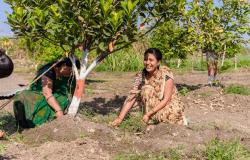A roadmap for global health diplomacy by India in the era of climate change

How India can respond to the global health challenges of climate change.
The COVID-19 pandemic brought global health security issues back to mainstream geopolitical engagement, but the inadequacies of current global governance mechanisms that it exposed remain. Ambitious plans to unanimously adopt a pandemic prevention, preparedness, and response treaty ran into trouble between countries over data sharing, intellectual property rights, and technology transfer. India and South Africa strongly advocated for a waiver of Trade-Related Aspects of Intellectual Property Rights (TRIPS) obligations for technologies necessary for pandemic control, which was opposed by many of the developed countries, resurrecting old policy postures.
India’s continued leadership in favour of improving access and affordability has earned it the reputation of a country that fights for the healthcare needs and rights of developing countries. However, in the past, this commitment was largely viewed through the lens of creating an enabling legal and trade environment for public health. In the wake of COVID-19, India seems to be actively embracing health as a tool of multilateral diplomacy, seeking to take its place as one of the rule-creators in the new era of global health governance.
While health security is not a key aspect of Indian foreign policy, the government found itself responding to the COVID moment and leveraging its traditional strengths as the ‘pharmacy of the world’. Seeking to project itself as a leader among countries of the Global South, Prime Minister Modi declared that “India’s vaccine production and delivery capacity will be used to help all humanity” at the UNGA in September 2020. Even as China was aggressively pushing its own “Health Silk Road” by leveraging its dominance of global health supply chains, India launched its own ‘Vaccine Maitri’ programme. India supplied vaccines to over 100 countries, sent medical supplies, equipment as well as human resources and, has even offered its vaccine registration and tracking system as a digital public good. India’s COVID overtures however remained relatively limited at ASEAN and BIMSTEC where China remained dominant. On the flip side, India actively participated in the US-led Global Action Plan framework to bridge policy gaps to end COVID in Februay 2022. The Indian Prime Minister also participated in Global COVID Summits convened by the US President Biden to coordinate response strategies.
The geopolitical dynamics of the pandemic is likely an indication of what’s to come as health becomes more integral to the climate geopolitics. Indeed, the global discourse on the pandemic is intersecting with climate change, as health becomes the ‘human face of climate change’. Concepts of “common but differentiated responsibilities”, drawn from climate accords are also making their way to negotiations over the pandemic preparedness treaty.
Collective action on climate and health is gaining momentum since the first Global Climate and Health Summit at the UNFCCC 25th Conference of Parties (COP25). This was followed up by a Health pavilion at COP26, Glasgow where health ministries of 52 nations committed to “resilient, sustainable, low-carbon health systems” and the WHO set up the Alliance for Transformative Action for Climate and Health (ATACH) to realise this ambition. This effort has been seconded at other multilateral platforms such as the G7 health ministers’ commitment in May, 2022 and the G20 New Delhi Leaders’ Declaration in Sep 2023. At the most recent COP28 in 2023, the WHO together with the Global Fund, the Green Climate Fund and the Rockefeller Foundation published their Guiding Principles for Financing Climate and Health Solutions. The 77th World Health Assembly this May, also adopted a resolution to address Climate Change and Health. Multilateral development agencies have also been quick to reinforce this prioritisation as demonstrated by the joint financing roadmap released recently by the Development Bank Working Group on Climate- Health.
The growing prominence of climate and health issues presents both a challenge and an opportunity for India. India has already positioned itself as a leader in climate action through initiatives like the International Solar Alliance and the Coalition for Disaster Resilient Infrastructure, both of which are also important for the health sector. Decentralised solar systems are emerging as a viable solution to electrify rural health facilities, improving access among remote, marginalised populations. A disaster-resilient health infrastructure initiative is being piloted to offer lessons for Himalayan regions.
Global visibility and its position as the world’s most populous country has created an imperative for India to deliver on all aspects of climate action. On health though, India has a long way to go to build credibility before it can stake its claim as a global leader.
In 2021, the Indian Prime Minister launched the "Lifestyle for Environment (LiFE)” initiative pushing to make individual behavior change and sustainable lifestyles the centre of the climate action narrative. In the absence of supportive policies and infrastructure to enable sustainable lifestyles LiFE will remain mere rhetoric. This is also at odds with the global discourse around large-scale, government-led action and net-zero commitments. India refused to sign the Declaration on Climate and Health at COP28 citing the impracticality of drastic emissions reductions in the short-term. While this is understandable given India’s healthcare context, the health delegation’s absence at other health-related events was an indication of the lack of a thoughtful position on the health impacts of climate change from India. Concepts of planetary justice and equity that were initially foregrounded by stakeholders in the Global South, especially civil society organisations and academics seem to be shrinking in the mainstream global discourse. With its large, diverse population and geography, India could be at the forefront of knowledge generation across the range of issues on climate and health. This would require strategic prioritisation of a research and learning ecosystem around these areas. International development assistance and climate financing is already primed to support this. India ought to lead the movement towards a cooperative climate and health framework that aligns the investment priorities of donors, with the practical needs of developing countries and their health systems.
Dr Neethi Rao is Fellow at the Centre for Social and Economic Progress (CSEP), New Delhi, India. The views expressed are the writer’s own and not those of CSEP. Rao has previously worked with the World Health Organization.
This Opinion article is not under a creative commons license and may not be reposted without the author's express permission.
Photo by EqualStock IN


